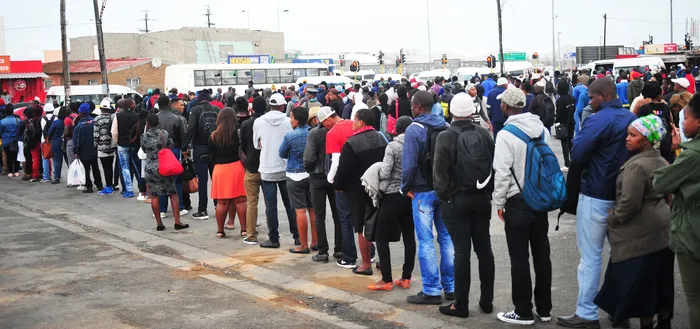Relief for Durban commuters as taxi strike ends after marathon talks

Thousands of commuters are left stranded in various areas in eThekweni
Image: Cindy Waxa/Independent Media
Apart from being a great inconvenience for thousands of commuters and a hammer blow to the local economy, the one-day taxi service shutdown in Durban also hurt those who used e-hailing services for their commutes on Thursday.
The shutdown ended on Thursday evening after protracted talks between officials from the taxi industry, and officials from the eThekwini Municipality and KwaZulu-Natal's transport department, resulted in the resolution of differences.
Last week, Durban's metro police impounded 25 taxis without the requisite permits in the Kwadebeka area. Taxi officials cited government bureaucracy hindered their members attempts to acquire permits, and resorted to the shutdown action in response.
Due to yesterday's taxi no-show, riders have claimed that e-hailing services have become opportunistic, capitalising on the increased demand for rides by hiking their rates.
According to a service user, the short trip from Berea to Durban's CBD usually costs around R80 but has since shot up significantly to R120.
On Wednesday, the South African National Taxi Council (Santaco) announced that it would embark on a two-day shutdown beginning yesterday, which left commuters—mostly workers and schoolchildren stranded without transport.
The reflex action for some commuters was to use e-hailing services, but they have been perplexed by the sudden spike in fares.
A daily rider, Nokubekezela Dube, expressed her frustration at what she termed "exorbitant" e-hailing rate increases.
"When it comes to the financial aspect, the prices are ridiculous. You could be just a few minutes away from your destination, and they can charge you an extortionate amount.
With this whole shutdown situation, people are going to be exploited; they (service providers) are going to utilise this situation to profit from us.
A ride that would normally cost R35 will be doubled or tripled," said Dube.
Another commuter, Amahle-amanzima Mazibuko from New Germany, told the publication that she had no choice but to use e-hailing services, as taxis were not operational. "We have no other choice.
They have heightened the prices because demand is high, and due to our worry about safety, we are also going to comply," explained Mazibuko.
Some commuters held the view that drivers were taking advantage of the situation. "Yes, they are exploiting the situation as they know that people will have no choice but to use their services because they are the only form of transportation available on that day," Minenhle Zikhali from Umlazi Township claimed.
However, an Uber driver, who spoke on condition of anonymity, refuted claims that Uber and Bolt drivers were manipulating the system.
"The more the demand, the higher the prices. When the app is busy, the prices will go up; that's how it works. Drivers are not taking advantage of anyone.
We are making an honest living. We are not the ones managing the app.
Then the allegations that we are exploiting people make no sense," explained the driver.
Omar Parker, Secretary for the National E-hailing Federation of South Africa (NEFSA), also rejected allegations that drivers and operators were increasing prices.
"The multinational app companies are controlling pricing and commissions, not the drivers.
They (app companies) are adding fuel to the fire in full view of the government, which is supposed to protect our economy and its citizens.
The public must be made aware of this ongoing exploitation," Parker added.
Uber provided the Daily News with a statement in response to recent developments, indicating that its fares are dynamic and take into account various factors in determining its rates.
"On the Uber platform, fares are dynamic and consider a number of different factors, including distance, estimated trip duration, and real-time factors like traffic and available drivers.
In response to the current protest action in Durban, we proactively capped any surge pricing in the area to ensure riders continue to have access to fair and consistent fares," read the statement.
In an effort to resolve the impasse between the taxi operators and the city, Mayor Cyril Xaba and Transport MEC Siboniso Duma held talks with key stakeholders in the taxi industry, including Mathula Mkhize, leader of the eThekwini Metro Taxi Council, along with City Manager Musa Mbhele and others.
DAILY NEWS